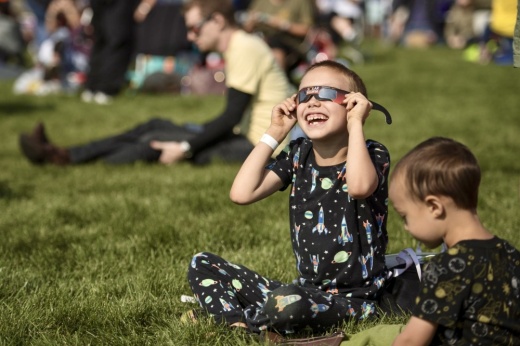“The main thing is safety, that’s our key,” Lakeway Communications Director Jarrod Wise said. “We want to make sure our residents are safe, our businesses are safe and also that the visitors that come through our area are safe.”
The total solar eclipse will be the second celestial event Central Texans will experience in the span of six months, following an annular solar eclipse Oct. 14, when the moon covered the center of the sun, leaving a “ring of fire.”
After the eclipse, Hill Country officials have said they are hoping to attract astro-tourists back for the view of the stars at night, which they are working to preserve.
The big picture
Hundreds of thousands of visitors are expected to travel to the Texas Hill Country to watch the moon completely block the face of the sun on April 8, said Dawn Davies, the Night Sky program coordinator at Hill Country Alliance. The rarity of the event has garnered a lot of interest both from tourists and area residents.
Total solar eclipses, on average, are visible somewhere on Earth approximately every 18 months. However, Davies said a total solar eclipse recurring in the same place happens every 350-400 years or so.
“We are not going to see an eclipse pass through the Hill Country like this for generations upon generations,” Davies said.
In light of the spectacle, Lake Travis-Westlake area officials have made efforts to coordinate resources and personnel leading up to April 8.
Much of this local work has been led by Waheeda Yousofzoy, the emergency management coordinator for Bee Cave, Lakeway and Village of The Hills. Yousofzoy has been working with a number of entities, ranging from Lake Travis Fire Department to the U.S. Department of Public Safety, to prepare for the upcoming event.
“You can plan for 200 [visitors], but planning doesn’t mean that we’re not going to get 2,000 visitors,” Yousofzoy said. “Making sure we have the resources, that’s my focus.“
Lakeway’s Wise and Yousofzoy said residents should stay off the roads and prepare beforehand to ensure they have enough fuel, food and water to avoid the “traffic nightmare” following the eclipse.
Similarly, several school districts across the Central Texas area have canceled school April 8 due to traffic concerns, including Lake Travis ISD.
“We encourage you to throw a viewing party for your friends [and] family and leave the roads to the tourists,” Bee Cave Mayor Kara King said in a statement to Community Impact.
Safe viewing
- Get to viewing location early
- Limit travel on major roadways day of event
- Do not use smartphone cameras, sunglasses, etc., to view the eclipse
The solar eclipse can be seen in the Lake Travis-Westlake area from 12:17 p.m.-2:57 p.m., with the duration of totality lasting 3 minutes and 15 seconds.
Experts are recommending spectators view the solar eclipse with ISO Certified eclipse glasses or cards until maximum coverage of the sun—or totality—is reached, when it is then safe to observe without protective wear.
Various businesses, parks and educational centers in the Lake Travis-Westlake area are holding events to witness the eclipse.
When to watch
Times for viewing and glasses are listed for the Lake Travis-Westlake area but vary by location.
- Partial eclipse begins: 12:17:31 p.m. (need glasses)
- Full eclipse begins: 1:35:07 p.m. (no glasses)
- Maximum eclipse: 1:36:47 p.m. (no glasses)
- Full eclipse ends: 1:38:22 p.m. (need glasses)
- Partial eclipse ends: 2:57:46 p.m. (need glasses)
Davies is hoping once the solar eclipse is over, people will stay to observe the sky at nightfall.
“Come for the sun, stay for the stars,” Davies said. “You can’t have a total solar eclipse without a new moon, and the best time to observe the night sky ... is during the new moon.”
Places with Dark Sky designations tend to attract astro-tourists, or people who travel from around the U.S. and sometimes even the world to experience astronomical events or phenomenons.
Texas has over 20 sites designated as International Dark Sky Places, including Bee Cave. The program certifies areas across the world that preserve and protect dark skies through lighting policies and public education.
Lakeway officials have made strides in the last year to eventually become a Dark Sky community by passing a Dark Sky Ordinance encouraging the use of certain lights to avoid light pollution.
“Currently we are not a Dark Sky certified city, but that is something that could be a potential in the future,” Wise said.
Something to note
Once a community or park receives a Dark Sky designation, it can generate additional tourism dollars from those seeking dark skies.
“It draws tourists—people will drive for [dark skies],” DarkSky Texas President Cindy Luongo Cassidy said.
Davies said roughly two dozen Hill Country entities are either in the process of submitting an application for a designation or hoping to start soon.
“There is such a draw to come out to take advantage of all the beauty and nature and history during the day, and then luxury under the night sky,” she said. “It’s given communities a great opportunity to use [dark skies] as a way to promote their area.”
Furthermore, dark skies can better support nature and the ecosystem. Luongo Cassidy said light pollution—the brightening of the sky by manmade or artificial sources—can negatively impact the migratory pattern of birds, the firefly population, pollinators and even humans.
“Light pollution affects every single ... creature on the planet,” Davies said. “We’re really hoping to continue to see this uptick in people taking an interest in becoming involved, becoming engaged, and telling people they know about [light pollution].”
Preserve night skies
Experts recommended a few steps residents can take to reduce light pollution.
- Replace light bulbs with warner colors
- Turn outdoor light fixtures downward
- Install motion sensors or timers for lights
- Use lighting on an as-needed basis
- Keep indoor lighting from escaping outdoors
Experts said the April 8 total solar eclipse will offer a different experience than the annular October eclipse, and they are encouraging spectators to pay special attention to nature during the event.
“There’s the experience of the moon’s shadow passing over you,” Luongo Cassidy said. “It’ll darken and you want to listen to what all the animals are doing as that light changes.”
Hill Country officials said they are looking forward to the benefits of tourism brought on not only from the eclipse, but also the region’s dark skies.
As a Dark Sky Community, Bee Cave has shown its dedication to preserving the wonders of the night sky, and getting to experience totality in their own city is very special, King said.
“We always enjoy having tourists to see our charming hive, visit our businesses and restaurants and see the beauty that is Bee Cave. We are looking forward to giving all visitors a warm welcome,” King said.





